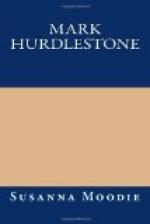Elinor shuddered.
“It was my determination to have rendered Algernon justice, and shared the property equally between us; but in this Algernon prevented me. He left the Hall in a tempest of rage; and when I made the proposal through my mother, my offer was rejected with scorn. I wrote to him before he left for India on the same subject, and my letters were returned unopened. You see, my dear Miss Wildegrave, I have done all in my power to conciliate my brother; but, like my poor father, his enmity is stronger than his love, and will not be entreated.”
This statement of Mr. Hurdlestone’s was not only very plausible, but it was partly true. He had indeed begged the dying man to forgive Algernon, and consent to his marriage with Miss Wildegrave; but then, he well knew that his father would neither do the one nor the other; while his own hypocritical interference only aggravated the old man’s anger in a tenfold degree, and would be the sure way of producing the result which he so ardently desired. He had offered to settle a handsome sum upon his injured brother, but he well knew that it would be rejected with scorn by the high-spirited young man. Elinor could not contradict these statements. She knew the impetuous disposition of her lover, and she more readily admitted their probability. Mark had been represented to her by him as a sullen, morose, avaricious young man, selfish, unfeeling, and cruel, suspicious of his friends, and implacable to his enemies. She had found him the reverse of all this; and she began to entertain doubts of Algernon’s veracity, and to conclude that it was for some more cogent reason than for any with which she was yet acquainted that his father had struck him out of his will, so anxious was she to acquit herself of being the cause of her lover’s exile, and the unfortunate circumstances in which he was placed. This, too, was selfish; but Elinor had been an only child, and very much indulged by her mother. She was a good, gentle, beautiful girl; but not exactly the stuff of which angels are made.
After this explanation had taken place, Mr. Hurdlestone became a daily visitor at the cottage; and his society and friendship contributed greatly to the comfort and amusement of its inhabitants. He never, to Elinor, made the least allusion to his passion. The passion, indeed, had long ceased to exist; he sought her not for love, but for revenge.
Time glided on. Algernon had been three years away; but his letters still continued to breathe the same ardent attachment, and Elinor was happy in the consciousness of being the sole possessor of his heart.
Her mother, who had more ambitious views for her daughter, often lamented her long engagement, which might never be completed. “She would rather,” she said, “have the rich Squire for her son-in-law; and she would not be at all surprised if Elinor herself was to change her mind before the ten years expired.”




